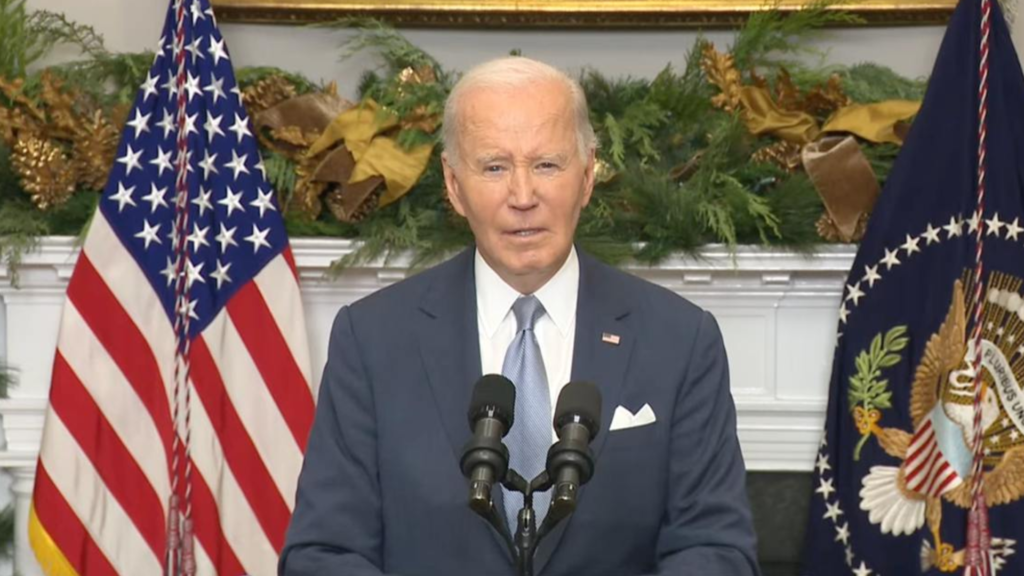
President Joe Biden addressed the nation Sunday evening, marking the fall of Syria’s Assad regime as a defining moment for the region and a triumph of U.S. foreign policy.
He attributed the collapse of Assad’s government to the weakened state of its key supporters—Iran, Hezbollah, and Russia—underscoring the role his administration played in diminishing their influence.
“For years, Assad relied on Iran, Hezbollah, and Russia to prop up his regime,” Biden said. “But in the past week, their support has collapsed. All three are far weaker today than when I took office.”
Russia has been bogged down in its protracted war with Ukraine since its invasion in February 2022, while Iran and Hezbollah remain tied up in their escalating conflict with Israel following Hamas’ October 2023 attacks.
The United States, he noted, has consistently supported Ukraine and Israel in their respective battles, which indirectly undermined Assad’s backers.
“These developments made it impossible for Iran, Hezbollah, or Russia to sustain their support for Assad,” Biden explained. “For the first time, none of these powers could defend this abhorrent regime.”
Biden called the fall of the Assad regime a “fundamental act of justice” and an “historic opportunity” for Syria’s people, who have endured decades of war and oppression under the Assad family. At the same time, he warned of the risks posed by the power vacuum left in Assad’s wake.
“The fall of the regime raises profound questions about what comes next,” Biden said, emphasizing the potential for extremist groups like ISIS to exploit the chaos.
He assured Americans that the U.S. would act decisively to prevent such a resurgence. Earlier in the day, U.S. forces conducted multiple precision airstrikes targeting ISIS camps and operatives in Syria, demonstrating America’s commitment to maintaining stability.
🚨🇺🇸🇸🇾 BIDEN: THIS IS THE BEST OPPORTUNITY FOR SYRIANS TO FORGE THEIR OWN FUTURE
— Mario Nawfal (@MarioNawfal) December 8, 2024
“It’s also an opportunity for a more secure and prosperous Middle East.
It would be a waste of this historic opportunity if one tyrant were toppled, only to see a new one rise up in its place.… https://t.co/i7kEWrxw48 pic.twitter.com/S5O9c1Vx1d
“We are clear-eyed about the risks,” Biden stated. “We will not allow ISIS to reestablish itself or create a safe haven.”
Biden laid out a comprehensive strategy to stabilize Syria and protect U.S. and regional interests:
- Supporting Syria’s Neighbors: The U.S. will assist neighboring countries in managing potential spillover violence and maintaining border security.
- Ensuring Stability in Eastern Syria: The President emphasized protecting U.S. personnel and facilities, particularly detention centers housing captured ISIS fighters. He noted that during the rebels’ takeover, prisons were overrun, and detainees were released, posing a significant security threat.
- Backing a Political Transition: Biden called for a United Nations-led process to establish a sovereign Syrian government with a new constitution. He emphasized that the future of Syria must be determined by its people, with the U.S. providing humanitarian aid and other support to aid reconstruction.
- Monitoring Rebel Groups: While praising the rebels for ousting Assad, Biden acknowledged that some factions within the coalition have histories of terrorism and human rights abuses. “We will evaluate not just their words but their actions,” he said, committing to vigilance as these groups assume greater responsibility.
Biden touted his administration’s broader strategy as pivotal in reshaping the Middle East’s power dynamics. He credited the U.S.’s “principled and clear policy” with enabling significant change in the region.
“Our approach has shifted the balance of power in the Middle East,” Biden said. “This is a direct result of the unflagging support we have provided to Ukraine and Israel, empowering them to stand against aggression and ultimately weakening their adversaries.”
Biden also emphasized the United States’ commitment to helping Syria rebuild after decades of devastation. “The United States will do whatever we can to support the Syrian people,” he pledged, highlighting plans for humanitarian relief and international cooperation.
The President specifically addressed the case of Austin Tice, an American journalist detained by the Assad regime 12 years ago. “We remain steadfast in our commitment to bringing him home,” Biden said.
President Biden on Austin Tice: "We believe he's alive. We think we can get him back, but we have no direct evidence of that yet." pic.twitter.com/jSbzxuxhsg
— CSPAN (@cspan) December 8, 2024
In a nod to critics who worry about U.S. involvement in another prolonged Middle Eastern crisis, Biden underscored the measured and strategic nature of his administration’s engagement in Syria.
He rejected notions of nation-building but reaffirmed America’s responsibility to support Syria during its transitional period.
“We are not imposing our will on Syria. Instead, we are empowering its people to reclaim their future,” Biden clarified.
However, he struck a cautious tone regarding extremist elements within Syria’s rebel factions. “Make no mistake,” Biden warned, “some of the rebel groups that took down Assad have their own grim records. While they are saying the right things now, we will judge them by their actions as they take on greater responsibility.”
Biden concluded by framing the regime change in Syria as part of a broader global struggle against oppression and extremism. “This is not just about Syria,” he said. “It is about ensuring that justice, sovereignty, and peace prevail in the face of tyranny. It is about building a world where people can live without fear, and where no regime can oppress its people without consequences.”
With these words, Biden sought to reassure Americans and the international community of the United States’ commitment to a more stable and just world order.

